It’s been quite the haunting journey over this past week, but the time has come to put an end to this eerie tale. You are reading the recap for The Fall of the House of Usher episode eight, “The Raven.”
This episode opens where the last one left off, with Roderick newly conscious on the ground, Verna standing over him. She starts reciting stats to him, telling him how many hundreds and thousands and millions of people have died, or become addicts, or ruined their lives as a direct result of his actions.
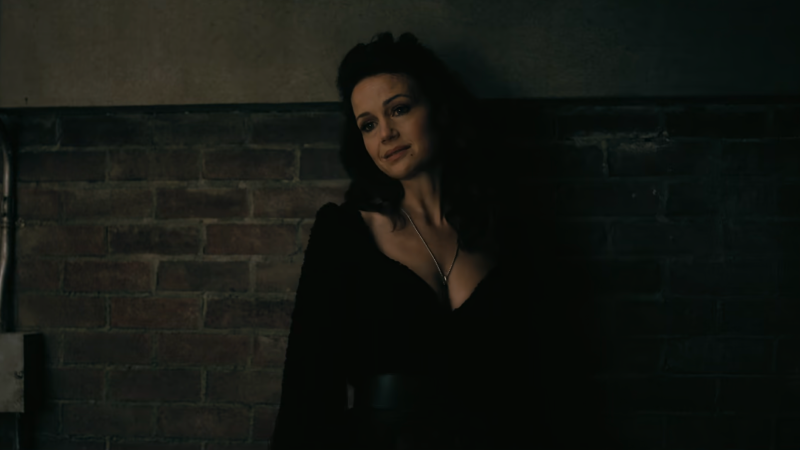
“Because I could not stop for Death, [s]he kindly stopped for me.”
She says there are only a few transactions left, time is almost up. She pauses at the wall to listen to the jingling before disappearing, leaving Roderick alone with the phantom jingles. And of course, this leads to a joker-faced jump scare, because it’s been a minute since we’ve had the pants scared off us.
Arthur Pym goes to talk to Lenore, who has just finished speaking to the police she called on her father. Pym says her father is dead now, so she should just retract her statement so he can die an upstanding citizen, but she refuses. He pleads with her, but she doesn’t budge. She doesn’t care about the company, or the family’s legacy, she cares about her mom. She calls Pym a “fucking ghoul,” a top tier insult if you ask me, and goes back to add more to her statement, not less.
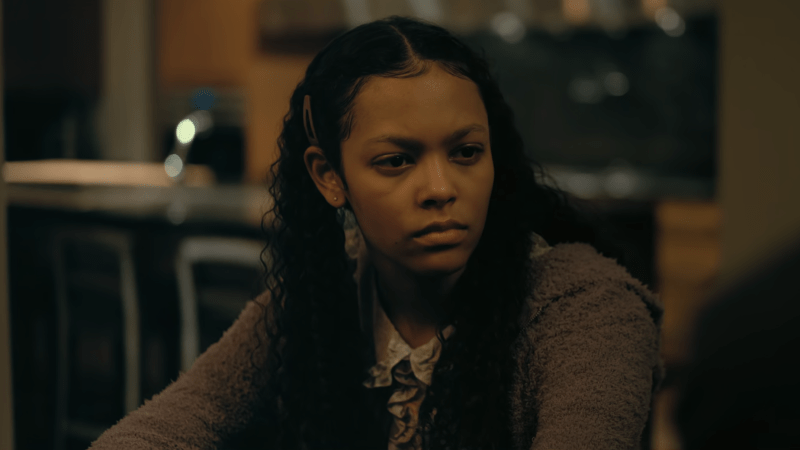
I’m stealing “you fucking ghoul” as an insult, it’s perfect.
When Pym relays this information to Roderick, he can’t even be mad. In fact, he’s proud. Madeline walks in, and she barely skips a beat when she sees the brother she watched die sitting there before her. She tells him that she’s been voted onto the board, and Roderick knows this was by design, not happenstance.
Present-day Auggie chimes in here, and says this is the point in the story where he was told to back down re: his case. He was told that Roderick had lost his children and his company, asked if that wasn’t punishment enough. But Auggie said it wasn’t. He wants justice. There are more bangs in the basement, and Roderick gets another text from Lenore that he ignores. Auggie is starting to get a little agitated, and I don’t blame him.
Roderick goes on to explain that he watched money rot his children from the inside out. That Annabel had custody of them until they were old enough for Roderick to tempt them with riches. And that money, that life, it twisted them until it had wrung all the Annabel out of them. And Annabel couldn’t live without them.
Roderick says that Lenore always had his fire, but Annabel Lee’s heart, her compass.
Roderick also says he saw Annabel Lee at the funeral. He recites more of her poem as we watch a flashback of him talking to an Annabel Lee that looks older than when we last saw her, but not nearly as old as him. She says that she watched her children disappear before her eyes, watched him siphon them. She says she once thought he was a rich man, but now she sees the truth.
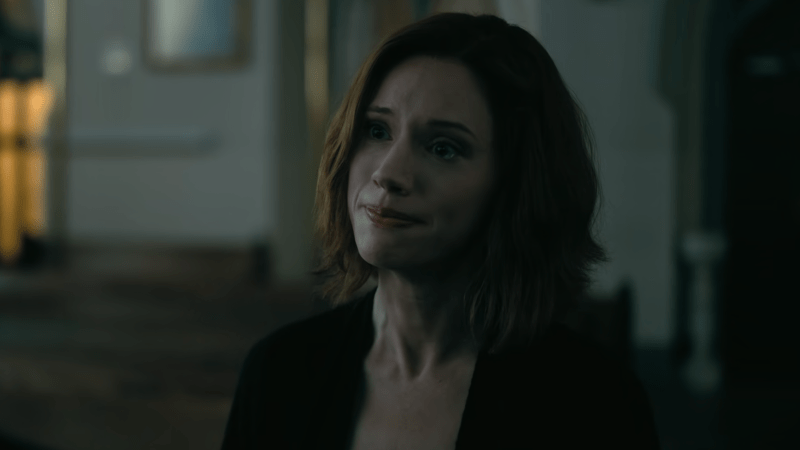
I just rewatched The Sixth Sense and her head wound reveal was VERY Sixth Sense.
Annabel turns away from him then, to walk toward her children’s caskets at the front of the church, and we see a gunshot wound in the back of her head. Roderick was being literal when he said Annabel Lee couldn’t live without her children.
We flash back again to right after the deposition, Annabel Lee is horrified Roderick would betray Auggie like that. Roderick tries to comfort her by saying he and Madeline have plans, that they are going to deal with Rufus Griswold, but she is still looking at her husband like he’s a stranger. She says the man she fell in love with would never do something like this, but now she’s starting to wonder if maybe she invented that man, and maybe he never existed at all.
After his encounter with Annabel Lee’s ghost at the funeral, Roderick leaves the church, gets spooked by the Jester in the limo, and falls unconscious while a raven looks down at him. We’ve come full circle.
In the present day, Auguste thinks Roderick couldn’t possibly have more stories to tell. He’s gone through the deaths of all six of his children, and he hasn’t confessed to a single murder. Surely there are more secrets to reveal, impossible as it may seem.
So Roderick presses on, and tells him about New Years Eve 1980, a night we’ve brief glimpses of. But this time, instead of starting at Verna’s bar, we start at the Fortunato company party, where everyone is touting Roderick as the hero of the company. Including a very familiar-looking jester, who pulls off his mask to reveal it is Rufus Griswold himself.
He also praises Roderick, saying that he’s already told everyone how great he is, already bragged about him to the board, already has Roderick’s office being built. Madeline smiles and says he should tell people the whole thing was his idea, and Rufus puffs out his chest and says he already has. This is exactly what Madeline wanted to hear, so she pours him a glass of Amontillado wine. They all toast, but only Rufus drinks, and then Madeleine seduces him down to the basement, where he says the construction he’s doing is soundproof, so they can make as much noise as they want. She teases him, never letting him kiss her, until he realizes he’s feeling a little wobbly. He falls to the ground, drugged, and Madeline stands over him, and calls him a “big, strong, powerful man” in a mocking tone. It’s pretty hot, actually.
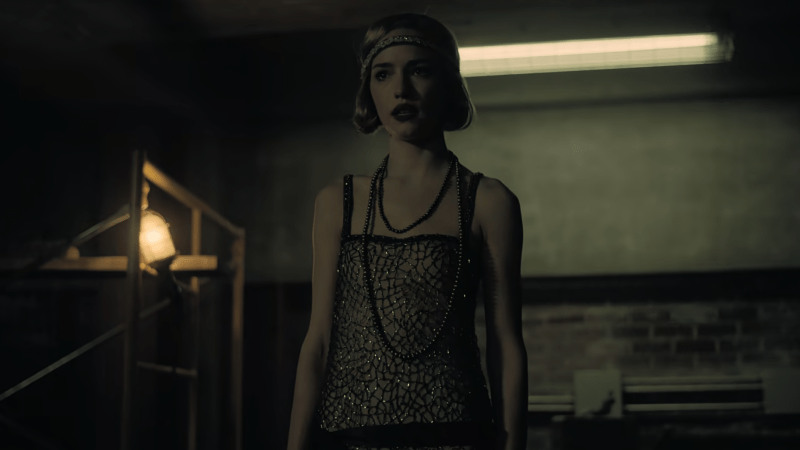
I believe the phrase I’m looking for here is, “Step on me.”
Whether you guessed it from the jingle of his jester hat or the name of the wine he was offered — perhaps it is no surprise to you that Rufus wakes up to Madeline and Roderick bricking him into a wall. Rufus is surprised, though. He pulls against his bindings, fruitlessly. He goes through the stages of grief right before their eyes as they lay brick after brick after brick, and Madeline relishes in his distress.
He starts with denial, simply in disbelief that it’s happening, because what the actual hell. He then bursts out in anger, threatening to kill them as if he could in this state. He then tries to bargain, offering money, a confession, his resignation. He offers them positions in the company, begs, pleads. But the twins explain that they already have all of that, without his help. He already set the stage for them. He’ll go down for the exposed crimes, and Roderick will be the new head of the company.
The depression stage kicks off as Madeline puts Rufus’s joker mask on him before laying a brick on which she wrote the greatest insult she knows, the worst one she’s heard: “You are so small.” And then when the wall is finished and the twins hear nothing, no screaming or begging or crying, just the quiet jingling of the bells, they know Rufus has reached the final stage of grief: acceptance.
And so their plan catches up to where we’ve seen it before, with them going to a second venue to be seen as an alibi. This time we skip to the end, with just Madeline and Roderick alone in the bar with Verna, closing the place down. Madeline explains that she wants to be rich and powerful, but not at the cost of serving a man. Verna asks “what about a woman” and Roderick ruins this perfectly good flirting moment by saying they “had a moment” because clearly he didn’t see Verna kiss his sister.
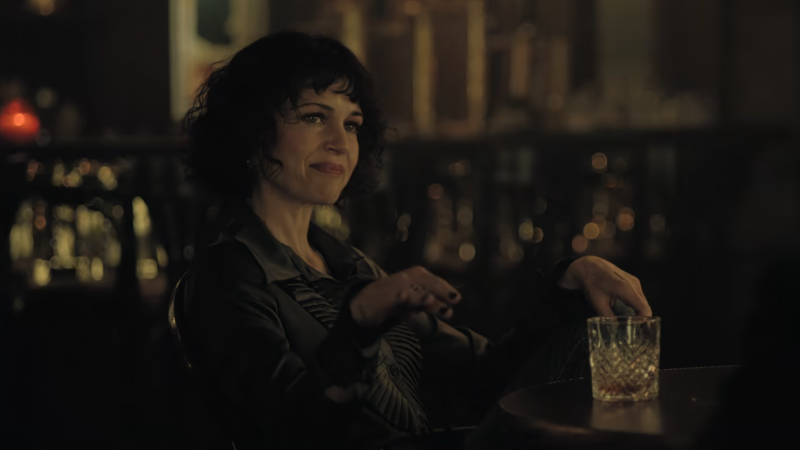
“You snooze, you lose, buddy boy.”
Verna asks the duo what they would do to make their dreams come true, to obtain all the success, money, and power they could fathom. Madeline says she doesn’t like working in hypotheticals, so Verna shows her hand a little, saying she knows they just bricked a man up in a basement and left him to die, to prove to them that they’re sitting outside time and space. Verna offers them a deal: they can become the leaders of Fortunato, their birthright. They will never receive legal consequences, just power and riches.
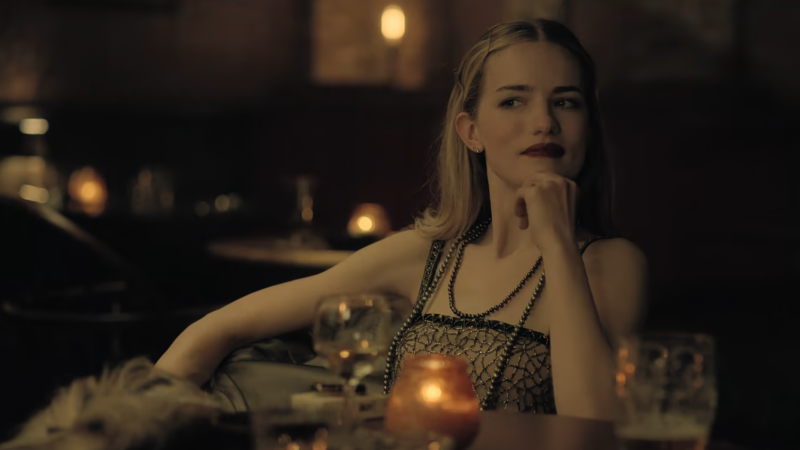
I know she’s cruel but there’s something about a lady who knows what she wants and goes after it I find hard to resist.
Roderick asks if it will costs them their souls, half-joking, but Verna answers in earnest, saying souls aren’t real, and if they were, theirs were already sold. Verna says that, in a way, they wouldn’t have to pay the cost at all. Their children would have to pay. Infinite riches, and when they would have died anyway, their bloodline dies with them. In 50 years or so, the whole Usher line will die. But those 50 years will be full of all the luxury they could dream of.
Then Madeline does something she doesn’t do very often: she looks to Roderick. So often she’s answering for the two of them, or for herself without waiting to hear what Roderick has to say. But this time she looks to Roderick; he’s the one with kids, surely this is a harder sell for him. She points out that the kids would have quite the life, and that it does sound like a good deal, but the speed at which Roderick agrees to it surprises even her. He has literal actual human children, and he agreed to it. His tone wasn’t joking, like he didn’t think it was a real deal he was being offered, he wasn’t being flippant. When asked what the cost he would be willing to pay for untold power and money, he essentially said, “Take my first born child, and the rest of them, too,” without any hesitation.
Verna put to them, the question of what’s better, 50 years of a gilded life or 80 years of struggling. The answer seemed obvious to the Ushers, but it’s hard to agree with them, especially after seeing how corrupt all of his children turned out to be. But whichever choice is better is entirely moot, because it wasn’t his choice to make. He signed it in blood that his children would pay for the sins of the father, and it’s a cruel choice to have foisted upon them.
And this is what is so brilliant about this character, how he’s written and portrayed in this show. I was genuinely surprised when Roderick was so quick to trade his children’s lives for gold. I shouldn’t have been. This show has spent 7 episodes showing me exactly who Roderick is, but I kept falling for the gentle voice, the soothing tones, the handsome face. He was so sweet and kind with Lenore, so sure in his business savvy. He wasn’t ripping anyone’s teeth out with pliers, so it took longer to register his insidiousness. I literally watched him brick a man into a wall and it still took him offering his children for wealth for me to truly register how evil he is.
Abuse doesn’t always look like screaming and hitting. Evil doesn’t always look like horns and pitchforks. And Death doesn’t always look like long robes and sickles. Sometimes she’s a straight-up babe.
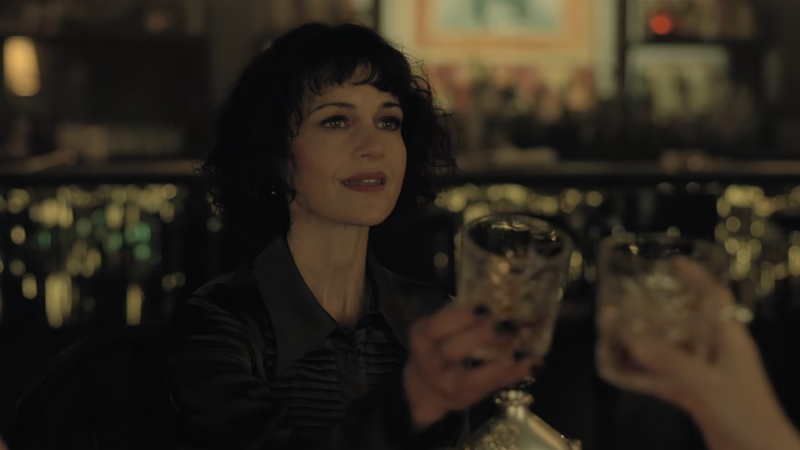
Is this why the phrase is “flirting with danger”? Because Death looks like THIS?
Verna is pleased that they took the deal. She pulls out a familiar bottle of expensive cognac, saying you drink it on the best day of your life, and the last. She toasts to the House of Usher, “whose time has come.” She tells the Ushers to go home and sleep, because they have a lot to do.
The twins leave the bar and are talking about how very weird that whole conversation was, and when they turn around, the bar is gone, just a wall with raven graffiti in its place.
Present-day Roderick says that the night faded like a dream, that they ultimately chalked it up to being drunk and stressed about the literal murder they committed, they decided it was a shared hallucination and they never talked about it again.
He also says that once, Pym found Verna. He was waiting for her at the old Usher house, and when she walked in, he drugged her and wrapped her in a tarp, swiftly and cleanly like he’d done it a thousand times before. When he’s done, Verna gives him a round of applause, no longer in the tarp, of course.
And I’d like to pause here to admire Verna’s look here.
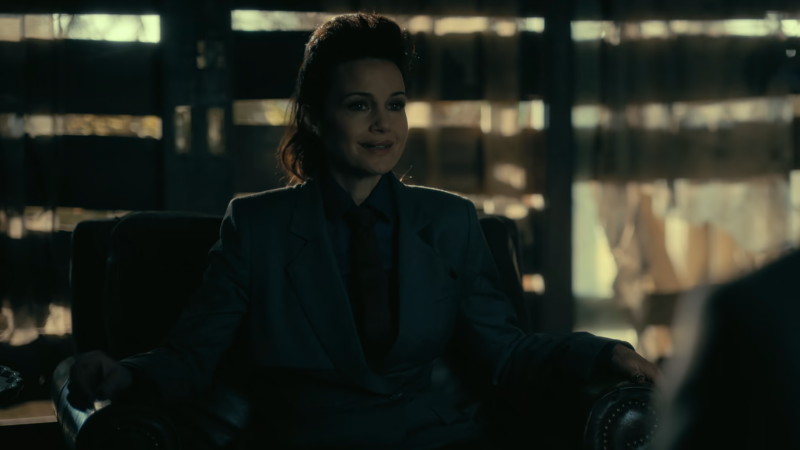
I know this poem was from the last episode but I cannot help but think of the lie, “Death reared [her]self a throne.”
Verna muses to Pym about how humans are so silly when it comes to money. They could solve all the world’s problems, like starvation, poverty, and disease, but they simply… don’t. Instead they buy yachts and spaceships and social media sites just to say they can. She asks what happens to Pym, when the Ushers are gone, when he can’t hide within the fortress walls of the deal they made. (She also has a line here that heavily implies that she has also offered one of these infamous deals to Trump, which made me wonder if she was, in fact, Death, as I had been assuming, or if she is perhaps the Devil herself.)
Pym asks what it would cost him, and Verna asks what he even has to offer. He says he has built his life to ensure he had nothing anyone could use as leverage against him, so he politely declines her deal. She says that’s fair enough; she’s not about to force one of her deals on anyone. In fact, I think there were a few times she wished an Usher or two would say no to her, surprise her, make a different choice. Alas.
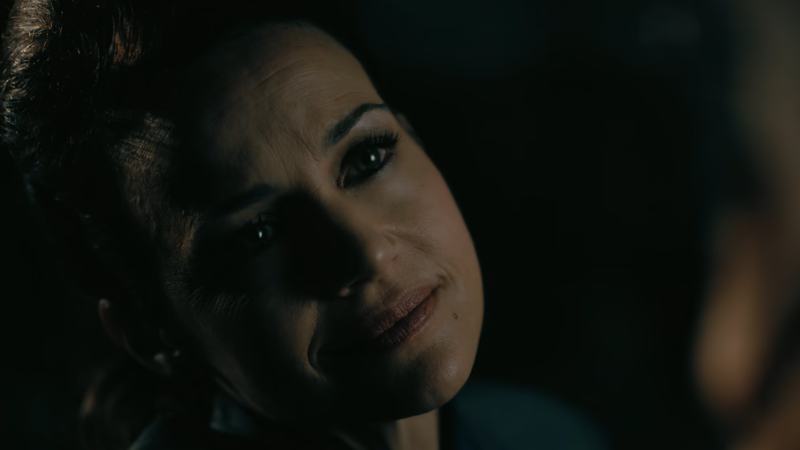
At this point this recap is just a love letter to Carla Gugino and I’m not even sorry about it.
After he returns home after his funeral fall, Roderick is tucked into bed at Lenore. She tells him that it’s a good thing he doesn’t have Fortunato anymore, that it’s not too late for him to do something good. She begs him to let it all go.
Lenore goes to stay in the guest room to go to bed, and she finds Verna there waiting for her. (Wearing black jeans, for the record. A more youthful look than we’ve seen her in.) Verna looks more solemn than we’ve seen her, not taking pleasure in what she has to do here at all. She repeats the word that had been reverberating around in my skull since she said it at the bar: bloodline. It wasn’t just Roderick’s children that had to pay the price he owed. It’s his bloodline.
Verna has Lenore sit next to her and tells her about a future she will never see: her mother will recover and inherit a lot of money. She will donate some of that money to domestic violence charities, and she will use the rest to start a nonprofit called the Lenore Foundation that saves millions of lives. Verna looks Lenore deep in the eyes and says that she wants her to really let that sink in: because she stepped in and saved her mother, and didn’t back down from telling the truth about his abuse, her mother went on to save millions of lives. Lenore did that. She offset her grandfather’s bloody legacy, at least a little.
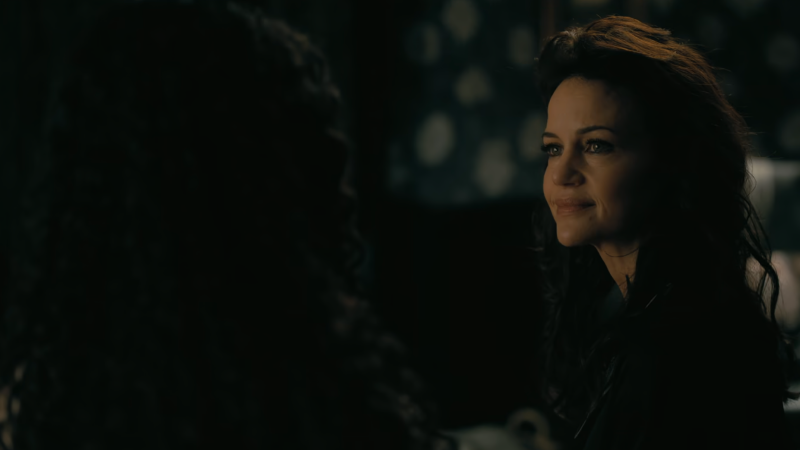
This is the only time in the entire series I shed a tear. Which is a step up from the full-finale weeping I do during Hill House and Bly Manor, but I knew Mike Flanagan couldn’t stay hydrated if he didn’t get us at least once.
Verna says sadly, “I thought you should know that,” before gently tapping the girl on the forehead. Unlike the people in the generation before her, Lenore dies gently, like falling asleep.
Present-day Auggie is confused by this part of the story. Lenore has been texting Roderick all night. But it hasn’t been Lenore, it has been the AI LenoreBot that Madeline set up. And all it says is NEVERMORE.
Roderick starts reciting Edgar Allan Poe’s “The Raven” while recounting how earlier in the night, he found Lenore dead and was haunted by her ghost and also a literal raven. He leaves this scene to go to the office, where he stands at the end of a boardroom table occupied by his dead bloodline, all gory, white-eyed, and unblinking.
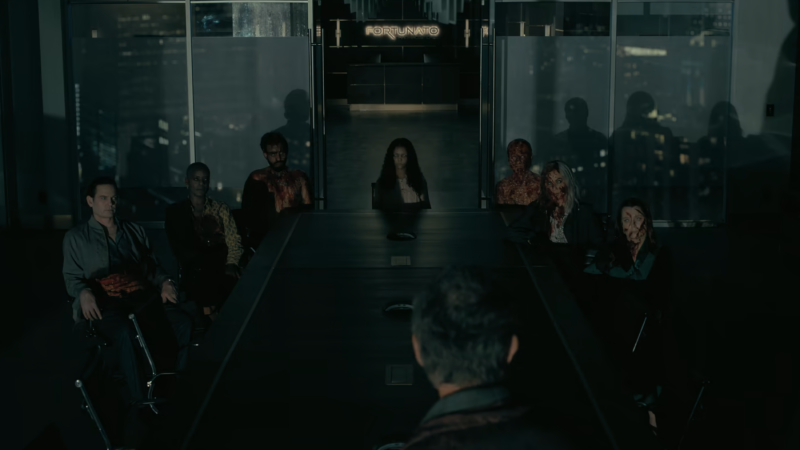
They look how I used to feel when I would have meeting marathons at my old job.
Verna replaces this ghastly image and says that she’s worked with a lot of influential people, but that Roderick has one off the highest body counts. She demonstrates this by making the rain outside turn to bodies falling from the sky. He watches the bodies pile up and she calls it his true monument, his mark on this world.
She tells him to go home, and invite Auggie, and that brings us up to the present.
When the basement noises start up again, Roderick admits that he only assumes those noises are Madeline, because not too long before Auggie showed up, he was in the basement with his sister. She asks why he filled it with so much stuff, and Roderick says he filled it like Egyption Pharaohs filled their tombs, so they had treasure in the afterlife. Madeline scoffs at this; gold is useless. Money isn’t even gold anymore, it’s 1s and 0s. She calls it, “a lie agreed upon.”
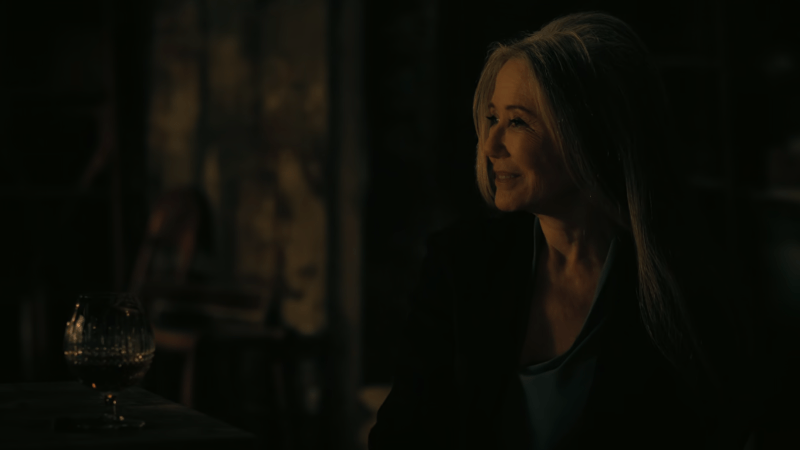
Therefore, we should cancel all student loan debt, since money is fake.
He asks his sister if she ever believed in the deal they made, believed that night was real, and Madeline says she believed it enough to get an IUD; clearly Roderick didn’t believe it nearly as much since he continued to pop out children. Roderick offers Madeline a drink, but he doesn’t partake. He watches with tear-filled eyes as Madeline sips and issues a diatribe about how the world has painted them as villains, but she doesn’t believe it. It’s wild because in the beginning it sounds like victim-blaming, saying addicts wouldn’t have become addicted if they hadn’t taken the drugs in the first place. But then she starts to make some actually good points about how viagra is funded before cancer trials and how the Supreme Court removes choice from the equation. She says they turn “men into cum fountains and women into factories,” which is quite the sentence, let me tell you. She makes a lot of good points about capitalism being a broken system, an evil cycle, but then she goes back to victim blaming again. She calls consumers monsters, says they wouldn’t exist if the demand wasn’t so high.
It’s quite the monologue.
Madeline ends her tirade by saying she wants to go out with her head held high, she says she doesn’t care if Verna is Death herself, she wants to look her in the eye as she goes. But Roderick took that choice from her. He drugged her, just like she drugged Rufus. He calls her a goddess, scoops out her eyes, and replaces them with the sapphires. Immortality, my darlings.
Auggie hears this tale with wide-eyed horror. He hears the thumping in the basement get closer and closer and asks if Roderick was sure his sister was dead after he replaced her eyes. Roderick remembers his mother, crawling from the grave to strangle the man who wronged her, and thinks that yes, perhaps Madeline isn’t quite done.
Roderick is still talking like this isn’t deeply upsetting news, and while Auggie gets increasingly stressed, Roderick continues talking, saying that deep down, he knew that his company was killing people, he knew there is no such thing as a painkiller. And in his final moments, he still displays hubris, saying he thinks he could have put that on the bottle and still sold it.
The sounds come to a head as a bloody-faced Madeline, sapphire eyes and all, comes careening out of the basement. The ceiling starts to cave in, and Roderick says simply, “Nevermore.” Madeline turns toward the sound and launches herself at her brother, wrapping her hands around his throat and strangling the man who wronged her.
Auggie runs out of the house and turns around just in time to watch the literal fall of the house of Usher. Lightning reveals a shadowy figure with glowing eyes standing atop the rubble, another flash turns her into a raven.
Some time later, Auggie goes to Roderick’s grave to finish the story. He says he gave up on his case and retired. Juno inherited everything, dissolved Fortunato, and started the Phoenix Foundation, which funded recovery research. Also, she weaned herself off Roderick’s drug and is clean now.
Arthur Pym was arrested after Camille’s assistants turned in her files, and he will die in prison.
Auggie says that the opioid epidemic is something they may never fully be rid of, but without Roderick actively making it worse, perhaps the world can start to heal. He leaves his recorder on his grave; this story ends here.
Auggie says one final goodbye, and says he’s going home to his husband, his kids, his grandkids. He smiles and says, “I’m the richest man in the world.”
When he leaves, Verna takes his place in the labyrinth of fresh gravestones on the Usher plot.
She recites more of Spirits of the Dead as she pays her respects to the Usher family. She places something on each of their headstones: A masquerade mask for Prospero, an iPhone for Camille, a cat collar for Napoleon, the heart prototype for Victorine, a gold bug for Tamerlane, and placed least gently of all, a bag of cocaine for Frederick. With the utmost care, Verna gently places a black feather and a white flower on little Lenore’s headstone.
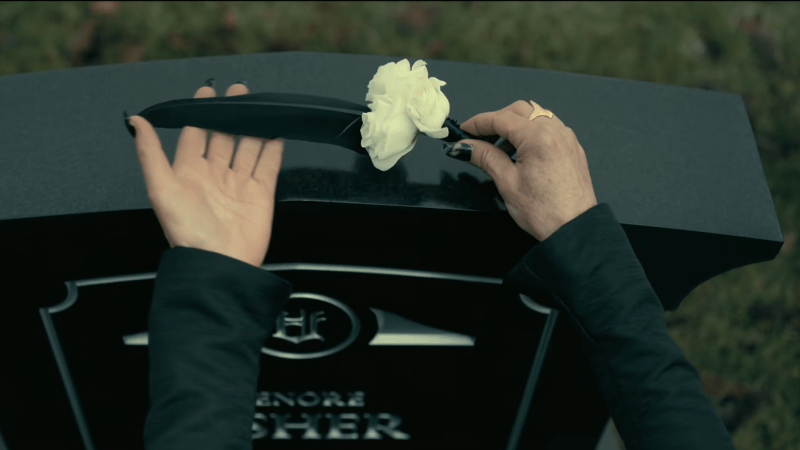
“Come! let the burial rite be read–the funeral song be sung!– An anthem for the queenliest dead that ever died so young– A dirge for her the doubly dead in that she died so young.”
Then finally, the twins: sapphires for Madeline and a crystal whiskey glass for Roderick.
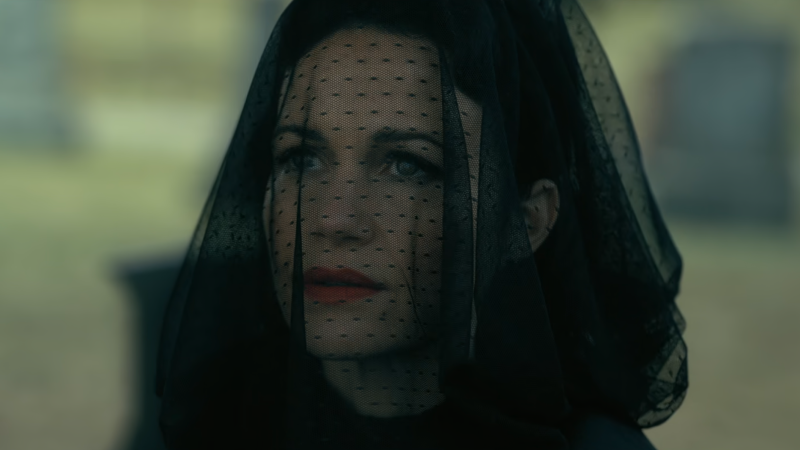
“‘Take thy beak from out my heart, and take thy form from off my door!’ Quoth the Raven ‘Nevermore.'”
Verna recites the final stanza of her poem:
The breeze—the breath of God—is still—
And the mist upon the hill,
Shadowy—shadowy—yet unbroken,
Is a symbol and a token—
How it hangs upon the trees,
A mystery of mysteries!
A raven flies to camera, and the credits roll. We have reached the bittersweet end of our mysterious tale.
Overall I really loved this show, and have nestled it smack in the middle of my Netflix Flanagan show rankings; after the Hauntings, but before the Midnights. A haunting and poetic tale of corruption, greed, and, of course, Death. I hope you’ve enjoyed the ride, and that you will share all your thoughts and theories in the comments!



Loved the show but think this episode was the weakest overall. Did we really need Auggie saying “I’m the richest man in the world”? He could’ve taken a phone call from his husband and gotten a much better effect. Completely agree on letting this be the Carla is amazing review lol
– Before we saw her mother, I seriously thought that it was going to come out in some way that Camille was secretly Roderick and Madeline’s child. She just seemed so much like her aunt.
– The one thing I hoped going into this series was that Juno was going to come out alive. The feel I got from her in the trailer was that she was trapped in the family and couldn’t get out. Good for her.
The ending had me going “you go Juno!”
What do you all make of Roderick’s decision with Madeline at the end? Was it pure evil? An eye for an eye, because she poisoned him first? Though it seems from the artifacts that he had long planned it.
Her ending was effective, but less fitting than the other deaths I thought, because she if anyone would have tasted the poison in time.
I think maybe it was a little of both. That he knew they would go out together, so he was preparing their tomb, but she forced his timeline up a little.
I thought it was actually pretty fitting, because of her line about being able to taste it. She fell into the very trap she set, her own hubris being her downfall.
Something tells me that Arthur Pym is going to do just fine in prison… loved this show!